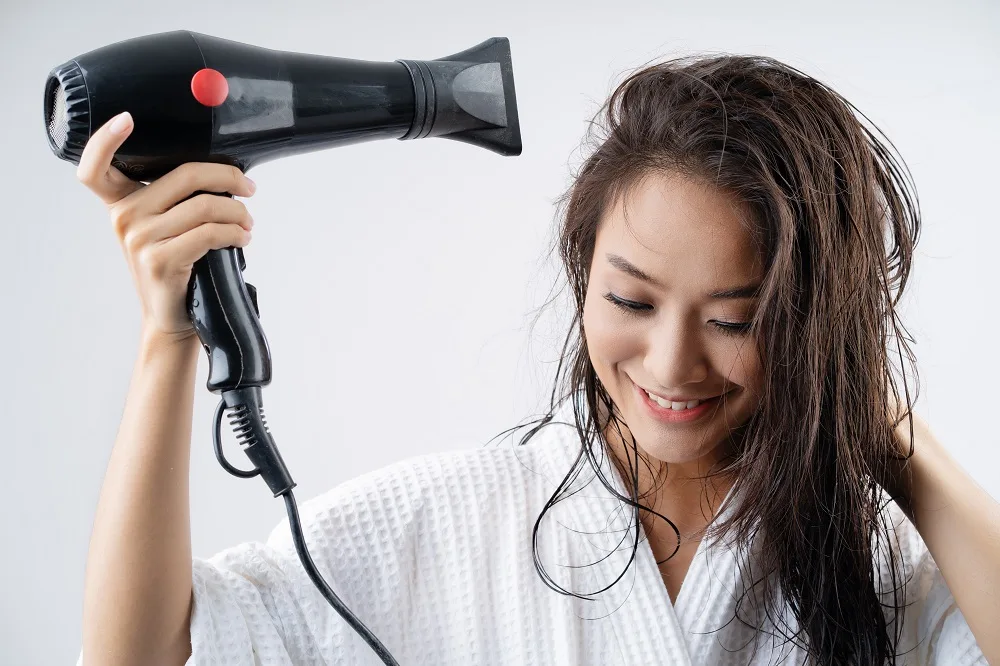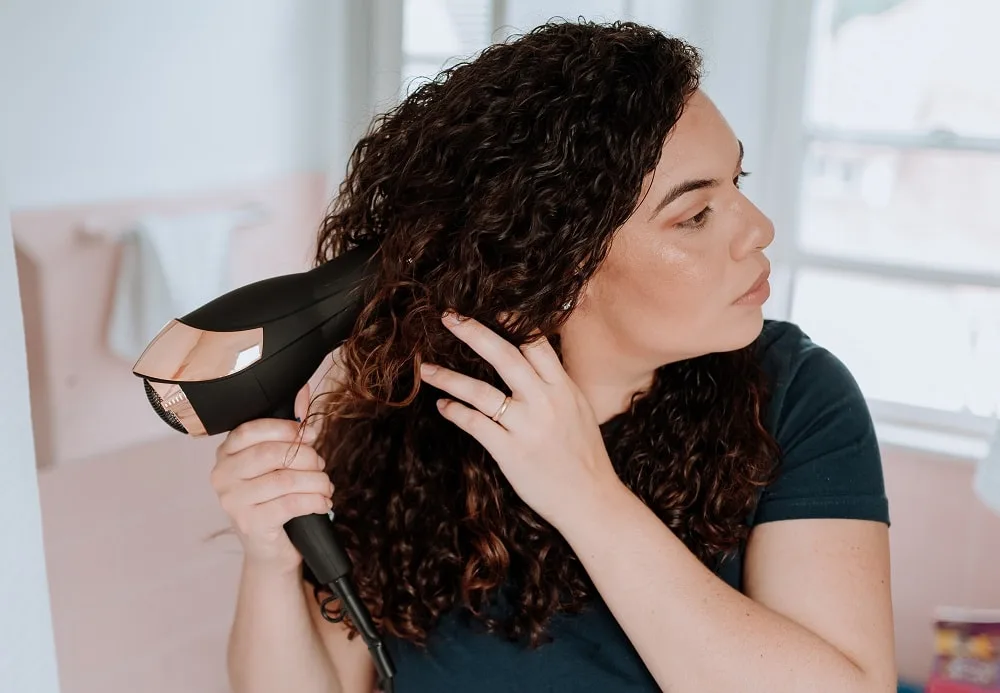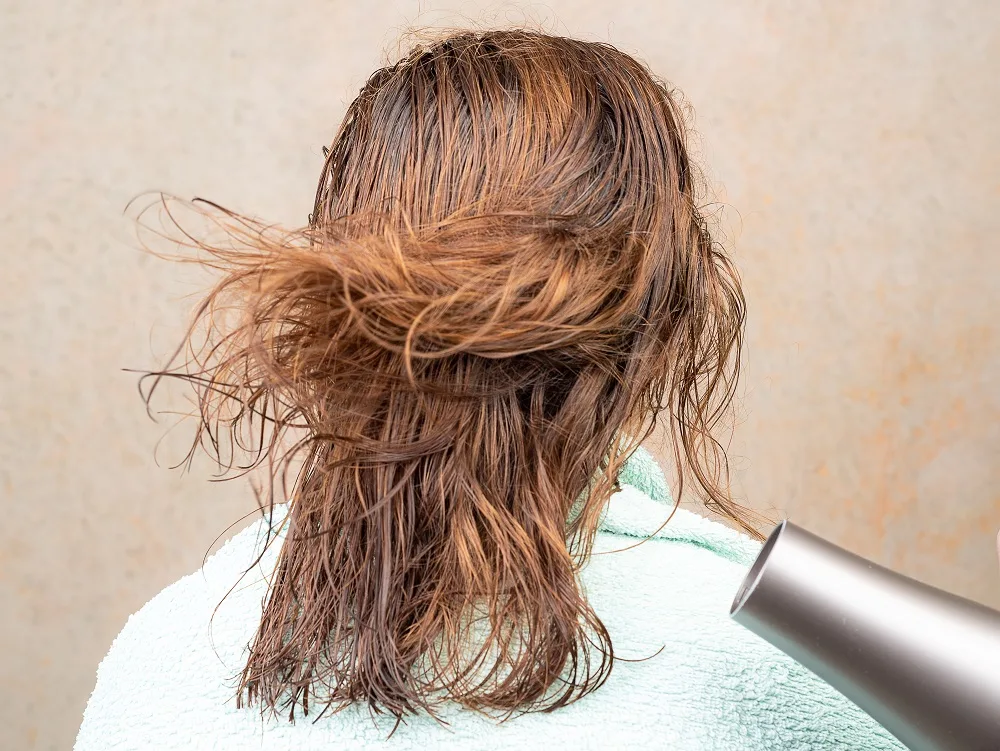For most people, hair dryers form an essential part of their hair routine. It would be impossible to achieve certain styles without them.
Unfortunately, using heat products like hair dryers incorrectly can do more harm than good over time. You may even be wondering, “Can hair dryers cause dandruff and frizz?”
We’ll answer that question in two parts below.
Can Hair Dryers Cause Dandruff?

Yes, improper use of hair dryers can create an environment that will cause dandruff on scalp.
If you use your hair dryer for extended periods, you may dry out your scalp too much and damage the scalp’s barrier.
You’ll know this has happened if you notice the characteristic white flakes of dandruff on your clothes.
Directing the heat too close to the scalp for prolonged periods can cause heat damage to your scalp skin, potentially leading to dryness, irritation, and flaking.
Some individuals may have a scalp that is sensitive to heat. For them, even moderate use of a hair dryer can cause scalp irritation that might resemble dandruff.
How to Use Hair Dryer for Dandruff-free Hair
Thankfully, this problem is easy to prevent. Follow these tips for dandruff-free hair.
Start on Drier Hair
It may be tempting to start drying your hair straight out of the shower, but towel-dry it first instead until it’s fifty to sixty percent dry. This technique ensures that you apply less damaging heat to your scalp.
Reduce the Heat
Speaking of heat, resist the urge to use your hair dryer’s highest heat setting. It may take you longer to dry, but the result is a healthier scalp because you’re not blasting it with heat.
Use a Nozzle

Using the right nozzle for your hair type can help prevent dandruff (and give you the look you want). If you’re after a straight look, you don’t have to worry about nozzles.
However, when drying curly hair, it’s best to use a diffuser, which (as its name suggests) diffuses the air evenly around your head.
Perfect Your Technique
You want to ensure the hair dryer is at least a few inches away from your head and never place it directly against your scalp. A good way to remember this tip is by working from your tips to your roots.
Additionally, try sectioning your hair into three or four parts. This method allows you to apply heat evenly and therefore avoid damaging your scalp.
Can Hair Dryers Cause Frizz?
Yes, hair dryers can cause frizz, especially if used incorrectly.
The heat from a hair dryer can damage the hair shaft, making it more prone to breakage and frizz. Additionally, excessive heat styling can strip the hair of its natural oils, leaving it dry and brittle.
Frizz happens when there’s not enough moisture in your hair, and there are several reasons this may happen.
Blow Drying too Close to Your Scalp

As mentioned above, applying heat too close to your scalp can cause dandruff. However, it also makes your cuticles swell, and swollen cuticles equal frizzy hair. Always take care to keep the hair dryer at a safe distance from your scalp.
You’re Not Using a Heat Protectant
Before using any heat product, it’s critical to set your hair up for success with a heat protectant. These products create a barrier between your hair dryer and your locks, keeping moisture in while stopping frizz.
Another reason to use heat protectants? They smooth the hair’s cuticle, ensuring shiny and soft hair.
Your Hair Is Still Wet

Though this reason may sound weird, it’s true: not drying your hair enough can make it frizzy. Residual moisture makes your locks swell, which turns into frizz.
You may not have considered this reason because sometimes it can be hard to tell if your hair is fully dry.
But if your hair is cold, that’s a good sign that it’s still damp. To avoid this problem, it’s best to put your hair in sections to ensure you’re drying all over after shower.
Your Hair Dryer Needs an Upgrade
If, despite everything, your hair is still frizzing after blow drying it, your hair dryer may be to blame. If you’re using a model with no heat settings or that gets too hot, it may be time to upgrade.
Ionic hair dryers are an excellent option, as the ions dry hair faster and smooth your locks as you style. They’re best suited for thick or curly hair–just be sure to look for something with 2,000 watts or more.
On the other hand, finer hair types can use traditional blow dryers with lower wattages.
So now you know hair dryers can cause dandruff and frizz. Although our favorite heat styling tools may sometimes work against us, getting back to healthy hair is often a simple matter of changing our habits.
